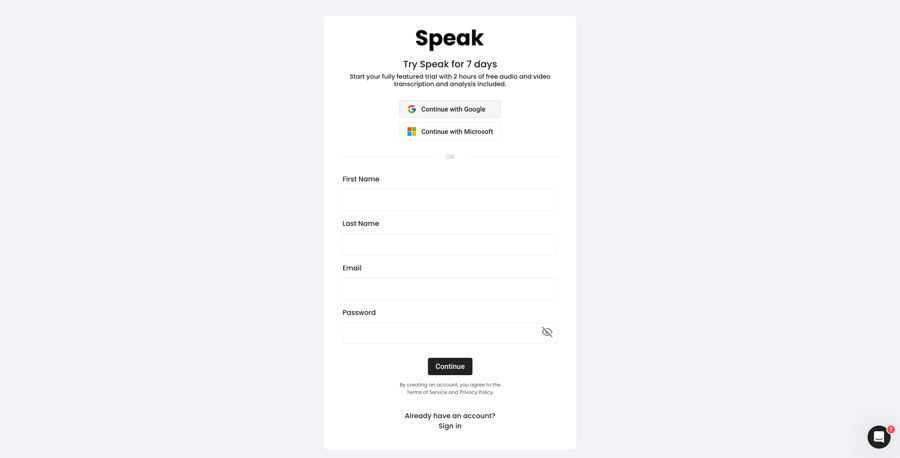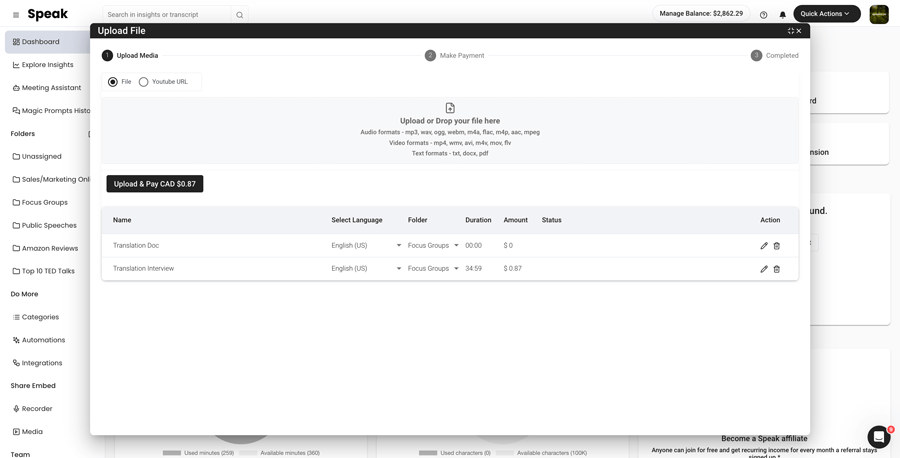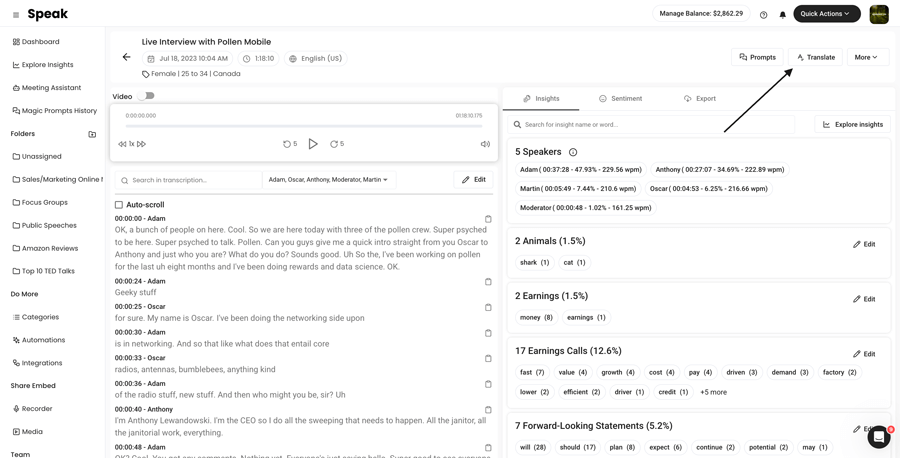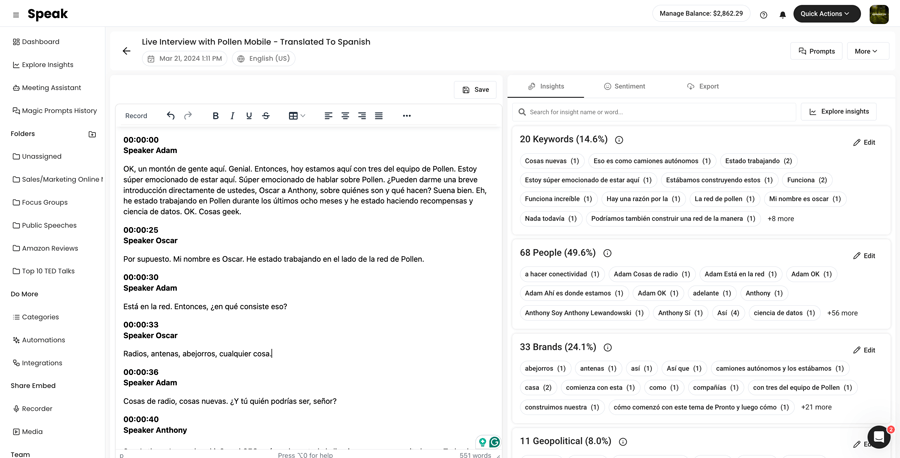How To Translate Latin to Portuguese (Portugal)
Translating Latin to Portuguese (Portugal) is super simple!

Step 1: Register for Speak
Register for Speak using this link.
Once you register, you can instantly begin translating your Latin to Portuguese (Portugal) file(s).

Step 2: Upload Your Latin file(s)
As soon as you log in, you will be redirected to the dashboard.
Once there, you can select the Quick Action "New Upload".
In Speak, you can seamlessly upload, transcribe and translate audio, video and text files all at once!

Step 3: Translate Your Latin file(s) to Portuguese (Portugal)
Once the file is uploaded, simply visit your file and select "Translate".
If it is an audio and video file, Speak will ask you if you want to keep the speaker names and timestamps in the translation.
Want to translate many files at once? No problem!
You can view the files you want to automatically translate from Latin to Portuguese (Portugal) from the folder level and instantly translate as many files as you need with our artificial intelligence translation in just a few clicks.

Step 4: That's It! View, Analyze, Modify & Export Your New Portuguese (Portugal) file(s)
Once the translation is done, you will be alerted and you will see a new document in the same folder your original file is in.
The file will be named the same but with a dash indicating that it is the translated version.
Need support with your Latin translation?
We are always here and happy to help at Speak!
Just send us a message on live chat on the bottom right corner and we will ensure you are set up for success.
Interested in translating Latin or other languages to different languages? View our entire list of supported translation languages here.
Automatic, accurate, instant AI translation from Latin to Portuguese (Portugal) is here for you.
Register for Speak using this link and begin translating Latin to Portuguese (Portugal) today.
Unlock the Benefits of Translating Latin to Portuguese (Portugal) with AI
Embarking on the journey from the classical language of Latin to the modern nuances of Portuguese (Portugal) is akin to bridging two epochs – from the historical depths of ancient Rome to the vibrant culture of contemporary Portugal. In this digital era, the value of swiftly and efficiently translating between these languages cannot be overstated, especially for researchers and businesses seeking to expand their horizons.
Why Translate Latin to Portuguese (Portugal)?
Translation from Latin to Portuguese (Portugal) serves as a conduit for understanding historical documents, advancing academic research, and ensuring the continuity of cultural heritage. For businesses, it opens up a realm of possibilities for connecting with a Portuguese-speaking audience by bringing historical context and authenticity to their services or products.
The AI Advantage in Translation
Speak AI, a leader in Natural Language Processing (NLP), transcription software, and artificial intelligence (AI), is at the forefront of revolutionizing how translations, including Latin to Portuguese (Portugal), are performed. By leveraging AI, automatic translation has become more accessible, accurate, and efficient, transforming the way we understand and relate to languages of the past.
Benefits of AI-Powered Latin to Portuguese (Portugal) Translation
- Accuracy and Efficiency: AI algorithms continually learn from vast datasets, ensuring high translation accuracy at incredible speeds.
- Cost Savings: Automated translations significantly reduce the cost compared to traditional translation services.
- Accessibility: Speak AI's translation services democratize access to historical Latin texts for Portuguese speakers, fostering greater cultural and academic exchange.
Use Cases: Academia and Beyond
Academic researchers analyzing ancient manuscripts, businesses seeking to globalize their content with historical accuracy, and educational institutions aiming to enrich their curriculum can all benefit from seamless Latin to Portuguese (Portugal) translation. Additionally, this service aids in the preservation and accessibility of historical documents, making it a valuable tool for archivists and librarians.
Engage with History: Latin and Portuguese (Portugal) Facts and Stats
Geographical Roots and Linguistic Evolution
Latin, once the lingua franca of the Roman Empire, laid the foundation for the Romance languages, including Portuguese, which emerged as a distinct language in the medieval period in the region now known as Portugal. This evolution underscores the deep historical ties between Latin and Portuguese (Portugal).
Contemporary Relevance: A Look at the Numbers
While Latin is primarily a scholarly pursuit today, Portuguese (Portugal) is spoken by over 10 million people, primarily in Portugal. It's part of the broader Portuguese-speaking world, which includes Brazil, Angola, Mozambique, and other countries, making it a global language with significant cultural and economic influence.
Latin and Portuguese (Portugal): Connecting Ages
Fascinating Linguistic Bridges
Latin and Portuguese share several linguistic features, such as similar grammatical structures and a large vocabulary of Latin-derived words. This makes the translation between the two not just a technical task, but a meaningful connection across time.
Diverging Paths
Despite their shared roots, Latin and Portuguese (Portugal) have diverged significantly. Latin's complex case system has simplified in Portuguese, and the languages have evolved uniquely in phonology and syntax, reflecting the dynamic nature of linguistic evolution.
Speak AI: Your Partner in Translation
With a 4.9 rating on G2 and over 150,000 users, Speak AI stands at the intersection of technology and language, offering unparalleled AI translation, transcription, data visualization, and generative AI capabilities. Our AI Meeting Assistant seamlessly integrates with popular platforms like Microsoft Teams, Zoom, Google Meet, and Webex, ensuring your international collaborations are not only understood but also meaningful.
Join the Speak AI Community
Whether you're a researcher delving into ancient texts, a business looking to connect with a Portuguese-speaking audience, or simply a language enthusiast, Speak AI's Latin to Portuguese (Portugal) translation services are designed for you. Embrace the power of AI and unlock the full potential of your linguistic projects. Sign up today and start your journey towards seamless, accurate translations.
FAQs: Latin and Portuguese (Portugal)
What locations are Latin and Portuguese (Portugal) popular?
Latin holds its popularity primarily in academic and religious contexts worldwide, while Portuguese (Portugal) is predominantly spoken in Portugal and has a historic presence in former Portuguese colonies.
What are some fun facts about Latin and Portuguese (Portugal)?
Latin is the official language of the Vatican City, and Portuguese is the official language in nine countries, demonstrating its extensive cultural impact. Furthermore, many English words are derived from Latin, showing its influence beyond the Romance languages.
What are the differences and similarities between Latin and Portuguese (Portugal)?
While stemming from the same Roman roots, Latin and Portuguese (Portugal) display significant differences in phonology, syntax, and grammar, with shared vocabulary and linguistic structures highlighting their common heritage.
Translate Latin To These Other Supported Languages:
- Translate Latin-to-Afrikaans
- Translate Latin-to-Albanian
- Translate Latin-to-Amharic
- Translate Latin-to-Arabic (Egypt)
- Translate Latin-to-Arabic (Iraq)
- Translate Latin-to-Arabic (Israel)
- Translate Latin-to-Arabic (Jordan)
- Translate Latin-to-Arabic (Kuwait)
- Translate Latin-to-Arabic (Lebanon)
- Translate Latin-to-Arabic (Oman)
- Translate Latin-to-Arabic (Palestinian Authority)
- Translate Latin-to-Arabic (Qatar)
- Translate Latin-to-Arabic (Saudi Arabia)
- Translate Latin-to-Arabic (Syrian Arab Republic)
- Translate Latin-to-Arabic (United Arab Emirates)
- Translate Latin-to-Arabic Modern Standard (Bahrain)
- Translate Latin-to-Armenian
- Translate Latin-to-Assamese
- Translate Latin-to-Aymara
- Translate Latin-to-Azerbaijani
- Translate Latin-to-Bambara
- Translate Latin-to-Basque
- Translate Latin-to-Belarusian
- Translate Latin-to-Bengali
- Translate Latin-to-Bhojpuri
- Translate Latin-to-Bosnian
- Translate Latin-to-Bulgarian
- Translate Latin-to-Catalan
- Translate Latin-to-Cebuano
- Translate Latin-to-Chinese (Simplified)
- Translate Latin-to-Chinese (Traditional)
- Translate Latin-to-Corsican
- Translate Latin-to-Croatian
- Translate Latin-to-Czech
- Translate Latin-to-Danish
- Translate Latin-to-Dari
- Translate Latin-to-Dhivehi
- Translate Latin-to-Dogri
- Translate Latin-to-Dutch
- Translate Latin-to-English
- Translate Latin-to-English (Australia)
- Translate Latin-to-English (Indian)
- Translate Latin-to-English (Irish)
- Translate Latin-to-English (New Zealand)
- Translate Latin-to-English (Scottish)
- Translate Latin-to-English (South African)
- Translate Latin-to-English (United Kingdom)
- Translate Latin-to-English (United States)
- Translate Latin-to-Esperanto
- Translate Latin-to-Estonian
- Translate Latin-to-Ewe
- Translate Latin-to-Farsi (Persian)
- Translate Latin-to-Filipino Tagalog
- Translate Latin-to-Finnish
- Translate Latin-to-French
- Translate Latin-to-French (Canada)
- Translate Latin-to-Frisian
- Translate Latin-to-Galician
- Translate Latin-to-Georgian
- Translate Latin-to-German
- Translate Latin-to-German (Swiss)
- Translate Latin-to-Greek
- Translate Latin-to-Guarani
- Translate Latin-to-Gujarati
- Translate Latin-to-Haitian Creole
- Translate Latin-to-Hausa
- Translate Latin-to-Hawaiian
- Translate Latin-to-Hebrew
- Translate Latin-to-Hindi
- Translate Latin-to-Hmong
- Translate Latin-to-Hungarian
- Translate Latin-to-Icelandic
- Translate Latin-to-Igbo
- Translate Latin-to-Ilocano
- Translate Latin-to-Indonesian
- Translate Latin-to-Irish
- Translate Latin-to-Italian
- Translate Latin-to-Japanese
- Translate Latin-to-Javanese
- Translate Latin-to-Kannada
- Translate Latin-to-Kazakh
- Translate Latin-to-Khmer
- Translate Latin-to-Kinyarwanda
- Translate Latin-to-Konkani
- Translate Latin-to-Korean
- Translate Latin-to-Krio
- Translate Latin-to-Kurdish
- Translate Latin-to-Kurdish (Sorani)
- Translate Latin-to-Kyrgyz
- Translate Latin-to-Lao
- Translate Latin-to-Latin
- Translate Latin-to-Latvian
- Translate Latin-to-Lingala
- Translate Latin-to-Lithuanian
- Translate Latin-to-Luganda
- Translate Latin-to-Luxembourgish
- Translate Latin-to-Macedonian
- Translate Latin-to-Maithili
- Translate Latin-to-Malagasy
- Translate Latin-to-Malay
- Translate Latin-to-Malayalam
- Translate Latin-to-Maltese
- Translate Latin-to-Maori
- Translate Latin-to-Marathi
- Translate Latin-to-Meiteilon (Manipuri)
- Translate Latin-to-Mizo
- Translate Latin-to-Mongolian
- Translate Latin-to-Myanmar (Burmese)
- Translate Latin-to-Nepali
- Translate Latin-to-Norwegian
- Translate Latin-to-Nyanja (Chichewa)
- Translate Latin-to-Odia (Oriya)
- Translate Latin-to-Oromo
- Translate Latin-to-Pashto
- Translate Latin-to-Persian
- Translate Latin-to-Polish
- Translate Latin-to-Portuguese
- Translate Latin-to-Portuguese (Brazilian)
- Translate Latin-to-Portuguese (Portugal)
- Translate Latin-to-Punjabi
- Translate Latin-to-Quechua
- Translate Latin-to-Romanian
- Translate Latin-to-Russian
- Translate Latin-to-Samoan
- Translate Latin-to-Sanskrit
- Translate Latin-to-Scots Gaelic
- Translate Latin-to-Sepedi
- Translate Latin-to-Serbian
- Translate Latin-to-Sesotho
- Translate Latin-to-Shona
- Translate Latin-to-Sindhi
- Translate Latin-to-Sinhala
- Translate Latin-to-Sinhala (Sinhalese)
- Translate Latin-to-Slovak
- Translate Latin-to-Slovenian
- Translate Latin-to-Somali
- Translate Latin-to-Spanish
- Translate Latin-to-Spanish (Mexico)
- Translate Latin-to-Sundanese
- Translate Latin-to-Swahili
- Translate Latin-to-Swedish
- Translate Latin-to-Tajik
- Translate Latin-to-Tamil
- Translate Latin-to-Tatar
- Translate Latin-to-Telugu
- Translate Latin-to-Thai
- Translate Latin-to-Tigrinya
- Translate Latin-to-Tsonga
- Translate Latin-to-Turkish
- Translate Latin-to-Turkmen
- Translate Latin-to-Twi (Akan)
- Translate Latin-to-Ukrainian
- Translate Latin-to-Urdu
- Translate Latin-to-Uyghur
- Translate Latin-to-Uzbek
- Translate Latin-to-Vietnamese
- Translate Latin-to-Welsh
- Translate Latin-to-Xhosa
- Translate Latin-to-Yiddish
- Translate Latin-to-Yoruba
- Translate Latin-to-Zulu



